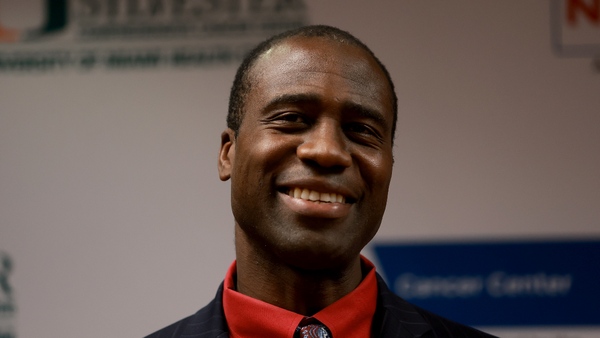
Poland has often been the victim of violent external aggression over the years – of Prussian militarism, Nazi invasion and Russian domination. But as an extraordinarily vicious, polarising election battle nears its climax, the national story has taken a disturbing turn. Divided Poles are making victims of each other.
Fighting the neighbours, often alone, is a familiar Polish occupation, going back to the days of the Austro-Hungarian empire and before. After finally breaking free of Soviet communism in 1989, Poland joined the Nato alliance in 1999 and the EU in 2004. But new friendships did not dispel old habits and enmities.
Poland remains at daggers drawn with Vladimir Putin’s Russia and the dictatorship in Belarus. Anti-German jibes remain commonplace. And the ruling hard-right nationalist Law and Justice party (PiS) has been fighting the EU over judicial, media and human rights standards ever since taking power in 2015.
More surprisingly, given its generous post-invasion support, Warsaw is now at odds with Ukraine, too, over refugees, weapons supplies and a Polish ban on low-priced grain imports. Kyiv took particular exception to recent, patronising remarks likening its plight to a drowning swimmer.
Amid indications of waning public backing for Ukraine’s war, the Polish president, Andrzej Duda, a PiS placeman, sneered that floundering Kyiv was “clinging to anything available”. It was possible it could “drown the rescuer”.
Yet with the 15 October election imminent, Poland’s propensity for scrapping with neighbours, friends and enemies alike, appears to be turning inwards. Opinion polls show the country is dangerously split. The tone of the campaign waxes venomous. In the partisan struggle for power, Poland risks pulling itself apart.
Warsaw’s allies are watching with mounting concern. One worry is future Polish adherence to the EU’s democratic rulebook. If he wins an unprecedented third consecutive term, the PiS leader and Poland’s de facto ruler, Jarosław Kaczyński, vows to finish the job through “reforms” that hogtie the judiciary, non-government organisations and private media in defiance of Brussels.
More broadly felt is a fear of PiS assuming the role of standard-bearer or exemplar for like-minded, authoritarian, anti-establishment and populist parties in Hungary, Slovakia, western Europe and in next June’s European parliament elections. Together they could block crucial plans for EU restructuring and enlargement.
Picture this nightmare scenario: a PiS-ruled Poland, the EU’s sixth largest economy, replaces Hungary’s Viktor Orbán as leader of Europe’s surging hard right in a Brexit-like struggle that could paralyse the EU. Kaczyński says he opposes “Polexit”. Yet it may become virtually impossible for Poland to remain on current terms.
PiS campaign themes and tactics resonate across Europe: passionate defences of national sovereignty and identity, climate scepticism, Ukraine war fatigue, attacks on woke culture, conspiracy theories and disinformation, character assassination and, above all, demands for tougher curbs on migration.
Donald Tusk, an urbane former prime minister and EU council president, was supposed to put a stop to all this. The idea was that his centre-right Civic Coalition would send oddball bachelor Kaczyński backhome to his pet cats and safely return Poland to the political mainstream.
But everywhere, it seems, the mainstream is flowing rightwards, while Tusk is smeared as a treacherous stooge of Germany, Brussels, even of Russia who, Guy Fawkes-like, would burn down the state. In an absurd, Donald Trump-like projection, Kaczyński calls him “the personification of evil”.
While in Brussels, anglophone Tusk controversially argued against Brexit. Now he’s fighting similar battles all over again, this time at home. His opponents claim he would raise the retirement age, sell off state companies to foreigners and bow to the green agenda in a country still heavily dependent on coal. He denies it all, but mud sticks.
Polls suggest Tusk’s coalition is 8 points adrift. But it’s not over yet. PiS may need help – from the extremist, anti-EU, anti-Ukraine Confederation party – to form a government. That’s driving it further to the right, deepening divisions and spawning more dirty tricks.
This is where Poland’s old tendency to fight the neighbours collides with electoral calculations. Tensions with Germany and Slovakia over illegal cross-border migration have escalated after PiS leaders accused Olaf Scholz, Germany’s chancellor, of interfering in Poland’s internal affairs.
This row is linked to a shocking visas-for-bribes scandal in which Polish consulates worldwide allegedly sold up to 250,000 EU entry visas for huge sums. For a government proud of its tough anti-migrant stance, this is excruciating. Tusk calls it Poland’s “biggest 21st century scandal”.
Relations with Berlin were already strained by renewed, voter-titillating demands for £1.1tn in second world war reparations. Europe minister Arkadiusz Mularczyk – writing in the Daily Mail, of all places – unscrupulously linked compensation by Germany to future Polish support for Ukraine’s reparation claims against Russia and Kyiv’s EU aspirations.
Poland has strongly backed Ukraine’s membership. But it’s increasingly clear it will exact a price. And attitudes in Warsaw could change, especially if it is caught up in wider battles over a newfangled, four-tier “multispeed” EU, common migration policy and Brussels’ continuing efforts to halt democratic backsliding.
Social issues, particularly women’s and gay rights, exacerbate political divisions. Thanks to PiS, Poland has some of Europe’s strictest abortion laws, allowing termination only in cases of rape, incest or a threat to the mother’s health or life. A survey in May found it has the worst record on LGBTQ+ rights anywhere in the EU.
Self-victimising Poland’s warring camps, ideologically, culturally and personally antagonistic, each portray the election as uniquely important, as a turning point akin to 1989. But the vote may also prove a curtain-raiser for a bigger, EU-wide drama of escalating strife, schism and rupture. All Europe is watching. But it’s not a pretty sight.







